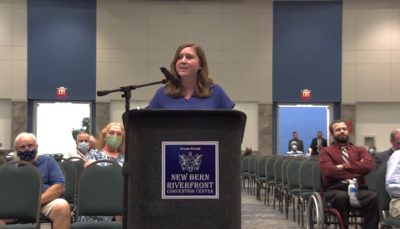|
|
I grew up in North Carolina and attended North Carolina public schools from kindergarten through 12th grade. In my experience, few kids were out at my school as LGBTQ+ and words like pronouns, gender nonconformity, and non-binary weren’t commonly used. These three audio stories, which I produced as a summer fellow for EducationNC, provide an overview of these terms.
It’s a look at transgender policies, the policymakers who shape them, and the students these policies impact.
In New Hanover County, where I live, the Board of Education amended one of their policies to allow for middle school students to play for the sports team that aligns with their gender identity. I attended the meeting and heard from the community’s diverse voices. Several were in favor of the policy change, and several were against. After the school board meeting though, I wondered: What does this policy actually do? How do trans and nonbinary students feel about it? How did this policy come together? And where are we going next?
These audio stories start in New Hanover County and then branch out across the state of North Carolina.
In my conversation with a student, I bridge the gap between people and policy with four steps educators can take to support the LGBTQ+ student experience:
- Introduce yourself with pronouns.
- Provide a gender neutral bathroom.
- Google doesn’t get offended. If you have a question about LGBTQ+ students, Google first.
- If you make a mistake with a student’s pronouns, say you are sorry, correct the pronoun, and move on.
Cultural traditions like “Yes, ma’am” and “Yes, sir” reinforce the gender binary as do gendered dress codes. Sports, schools, and trans concerns are discussed in the story, “Getting comfortable with the uncomfortable.”
I learned the burden of making the world more accepting shouldn’t fall just on students.
You can listen to all of the stories here.
Meet Alex, a trans student
If you only listen to one story, listen to this one. I talk with a trans, nonbinary, gender nonconforming student in New Hanover County to hear about their experience. We talk about the burden of making the world more accepting.
Getting comfortable with the uncomfortable
This story looks at how LGBTQ+ policies were first introduced in a school system. Then, it examines how a district changed a policy, discussing New Hanover County’s new policy that allows middle school students to play for the sports team that aligns with their gender identity.
Equity is a group project
In this story, I talk to a former member of the N.C. High School Athletics Association’s Board about the association’s gender identity policy. Then, I talk with the chief equity officer of Orange County Public Schools, Dena Keeling, to hear what she thinks is still needed to make schools more inclusive.



